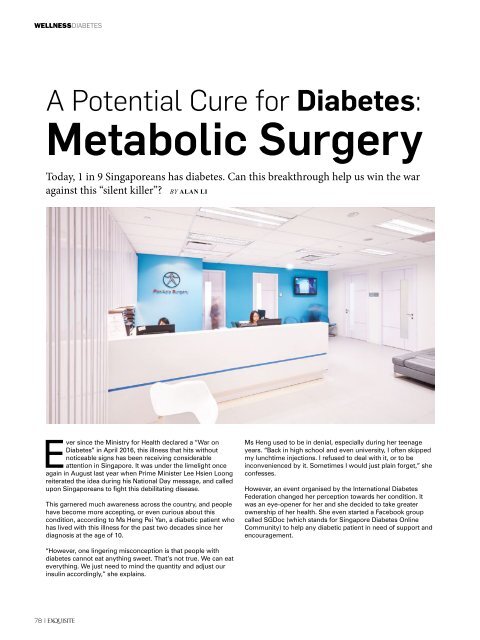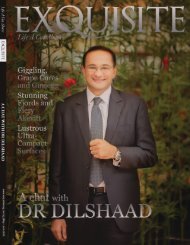Exquisite March 2018
Create successful ePaper yourself
Turn your PDF publications into a flip-book with our unique Google optimized e-Paper software.
Wellnessdiabetes<br />
A Potential Cure for Diabetes:<br />
Metabolic Surgery<br />
Today, 1 in 9 Singaporeans has diabetes. Can this breakthrough help us win the war<br />
against this “silent killer”? By Alan Li<br />
Treating Diabetes<br />
It has been a known fact by now that to treat diabetes, one<br />
needs to control his blood sugar levels in the body. Most<br />
people do it by medications, dietary changes and exercise. But,<br />
did you know that there’s a surgical method to treat diabetes?<br />
According to Dr Melvin Look, the Director and Consultant<br />
Surgeon at PanAsia Surgery in Mount Elizabeth Hospital and<br />
Parkway East Hospital during an interview with <strong>Exquisite</strong>, he<br />
shares his insights on this breakthrough in diabetes treatment.<br />
“The first step to the treatment of diabetes is a calorie<br />
restriction diet to achieve a healthy weight,” explains Dr Look.<br />
“Oral medication and insulin injections are often required to<br />
bring down the blood sugar levels. Good control of this is the<br />
key to avoiding the end-organ complications of diabetes.”<br />
However, he reveals that metabolic surgery may now be an<br />
excellent alternative for diabetic patients who want to consider<br />
surgery for a long-term cure. “Randomised control trials have<br />
shown that post-surgical patients showed better improvements<br />
in quality of life and overall health compared with those who<br />
only received medication alone,” notes Dr Look.<br />
“One of the commonest metabolic surgery operation we do is<br />
the Laparoscopic Sleeve Gastrectomy. It is a keyhole surgical<br />
procedure that coverts the stomach into a long narrow tube<br />
about the shape and size of a banana. This limits the amount<br />
of food the patient can eat and enhances the effect of intestinal<br />
hormones to bring down blood sugar.”<br />
Dr Melvin Look<br />
Metabolic Surgery VS Medications<br />
Who should undergo the surgery?<br />
According to Dr Look, metabolic surgery is highly effective in<br />
helping obese diabetics lose their excess weight. “The majority<br />
of patients will achieve an excess weight loss of about 70<br />
to 80% after 18 to 24 months. In addition, these operations<br />
also have a complex adaptive effect on our gastrointestinal<br />
hormones which play an important role controlling blood<br />
glucose levels,” he explains.<br />
He suggests that patients who require more than one<br />
medication for diabetes, or who are poorly controlled despite<br />
multiple medications, should consider surgery. “The best<br />
results are when patients come for surgery early, when they are<br />
young, rather than when they are older and have developed<br />
complications due to diabetes,” says Dr Look.<br />
Ever since the Ministry for Health declared a “War on<br />
Diabetes” in April 2016, this illness that hits without<br />
noticeable signs has been receiving considerable<br />
attention in Singapore. It was under the limelight once<br />
again in August last year when Prime Minister Lee Hsien Loong<br />
reiterated the idea during his National Day message, and called<br />
upon Singaporeans to fight this debilitating disease.<br />
This garnered much awareness across the country, and people<br />
have become more accepting, or even curious about this<br />
condition, according to Ms Heng Pei Yan, a diabetic patient who<br />
has lived with this illness for the past two decades since her<br />
diagnosis at the age of 10.<br />
Ms Heng used to be in denial, especially during her teenage<br />
years. “Back in high school and even university, I often skipped<br />
my lunchtime injections. I refused to deal with it, or to be<br />
inconvenienced by it. Sometimes I would just plain forget,” she<br />
confesses.<br />
However, an event organised by the International Diabetes<br />
Federation changed her perception towards her condition. It<br />
was an eye-opener for her and she decided to take greater<br />
ownership of her health. She even started a Facebook group<br />
called SGDoc (which stands for Singapore Diabetes Online<br />
Community) to help any diabetic patient in need of support and<br />
encouragement.<br />
As a result, this surgery has an additional beneficial effect on<br />
the control of diabetes beyond weight loss alone. “Almost<br />
all patients will experience an improvement in their blood<br />
glucose control. About 70% will require less medication or no<br />
medication at all,” says Dr Look.<br />
So, will weight regain and recurrence of diabetes happen after<br />
the surgery? “Yes, but this is rare and usually in non-compliant<br />
patients who are not motivated in maintaining their dietary<br />
recommendations,” says Dr Look.<br />
“It takes about 2 hours to perform this keyhole surgery, and the<br />
patient stays in the hospital for about 3 to 5 days. Majority of<br />
the patients are back to work and their normal routine 2 weeks<br />
after the surgery,” he continues.<br />
Risks and Side Effects of the Surgery<br />
Dr Look explains, “Laparoscopic Sleeve Gastrectomy is a very<br />
safe operation and serious complications, such as bleeding<br />
and leakage of the staple line, are rare. The main long-term<br />
side effects are heartburn and reflux, especially if the patient is<br />
already prone to this even before the surgery.”<br />
The estimated total cost is between $25,000 and $40,000,<br />
depending on hospital preferred and whether there are<br />
associated medical problems which require concomitant<br />
management. Many medical insurance policies do cover for<br />
these surgeries if the indication is medical and not cosmetic for<br />
elective weight loss alone.<br />
“However, one lingering misconception is that people with<br />
diabetes cannot eat anything sweet. That’s not true. We can eat<br />
everything. We just need to mind the quantity and adjust our<br />
insulin accordingly,” she explains.<br />
78 | EXQUISITE<br />
EXQUISITE | 79
















